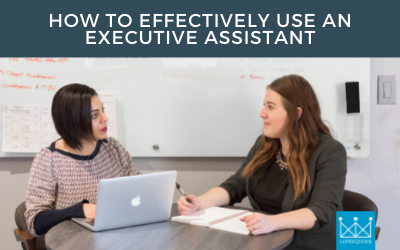How to Effectively Use an Executive Assistant

An executive assistant can be a company’s secret weapon, playing a vital role in an organization’s success. By helping to optimize an executive’s productivity, EAs provide a significant return on investment. But these benefits only occur when the executive knows how to effectively use an executive assistant. A poorly utilized EA can be a drain on an executive’s time instead.
How to Effectively Use an Executive Assistant
An executive assistant’s effectiveness is dependent on how an executive manages and supports them. A positive relationship between an executive and EA makes a difference in the value the EA provides.
So how do you utilize an EA effectively? Follow our advice!
Clarify Your Expectations Early On
Establish an effective working relationship with your executive assistant by clarifying your expectations from the beginning.
Communicate with your executive assistant and be as straightforward as possible about what you need from them. Establishing expectations will help your EA do their job more efficiently. It will also make it easier for them to anticipate your needs moving forward.
Key things to communicate with your EA early on are:
- Your preferred communication method
- The main tasks you need assistance with
- Which tasks you don’t like doing
- Which tasks and projects are a priority
- Your most important work obligations
- Your vision and long-term goals
- Your business pet peeves
When hiring an EA, make sure to plan time during their first couple of days to discuss these things. You’ll also want to set your executive assistant SMART goals and schedule regular check-ins to see how they are progressing. These goals are an easy way to make sure that your EA is meeting your expectations.
Establish Boundaries
Another thing to do with your EA early on is to establish boundaries. The relationship between an executive and an EA is a close one. EA’s often end up helping you personally as well as professionally. They become a trusted confidant and even a friend. And while it’s great to get to know your EA, it’s also key to maintain professional boundaries.
Maintain professional boundaries with your EA by:
- Establish Work Hours. Don’t expect your assistant to be available after work hours. If you need them after hours, ask if they’re free to help. It’s not reasonable to expect an EA to be available 24/7.
- Don’t Push for Information. You don’t want or need to know about your EA’s personal life. If your EA doesn’t want to share what they did during the weekend or why they have a personal appointment at lunch, accept it and move on.
- Minimize Personal Chat. Once you become close to your EA, it can be easy to spend your entire Monday morning meeting catching up. You then start the week behind on your to-do lists. During working hours, keep personal chats brief. You can always catch up further during lunch.
- Don’t Treat Your EA Differently. Although you may work closely with your EA, try not to treat them differently than other employees. Special treatment can make other employees feel less valued. Your EA may also end up expecting too much from you.
Without establishing boundaries, your relationship with your EA could go from comfortable to full of resentment.

Learn About Your Executive Assistant
While it’s important to establish professional boundaries, that doesn’t mean you shouldn’t get to know or even become friends with your EA. Many working relationships turn into friendships, especially when you work together as closely as an executive and EA do.
Get to know your executive assistant early on. Ask about their life and interests. Discover things you can bond over. Getting to know your EA personally can lead to greater openness, trust, and empathy in your working relationship.
It’s helpful if you also open up to your EA about your life. By getting to know you, your EA will learn how to best support you. Be transparent about any professional or personal issues you might be having. They might be able to take things off of your plate that you hadn’t realized.
Delegate and Relinquish Control
The most important way to effectively use an executive assistant is to make sure you’re using them.
Delegation is a vital trait of a great executive. But many executives don’t delegate enough to the one person who can help them the most, their EA.
It’s vital to understand your value as a strategic leader of the company. There are many low-value tasks you do every day that are a drain on your time. Surrender control of your email, phone, and calendar. These tasks are what your EA is there for.
If a task doesn’t impact business growth or if it’s something you don’t have time for or hate doing, delegate it to your assistant.
Don’t Underestimate Your EA’s Strategic Value
EAs can handle high-value tasks too! EAs are no longer the secretaries of yesteryear who were only around to answer calls and take meeting minutes. An EA can be your right-hand person and a valuable strategic partner.
Executive assistants are privy to leadership conversations and actions at all levels of the organization. They can use their strong analytical skills and business acumen to offer a unique and well-rounded perspective on projects and ideas.
Ask your EA for their opinion on big strategic decisions. Use them as your sounding board. Encourage them to contribute their ideas. You never know what valuable insights they might provide.
Including them in important conversations and decisions also helps your EA feel empowered, trusted, and appreciated.
Allow Your EA to Represent You
An executive assistant can use their inside knowledge of the business to represent you at meetings and events. EAs can attend business conferences, client lunches, or even community and charity events.
Don’t keep your EA stuck in the office. They can attend beneficial events on your or the company’s behalf.
Offer Your EA Regular Feedback
Finally, maximize your relationship with your executive assistant by offering regular feedback.
Positive and negative feedback helps your EA grow in their position and know what they need to improve. You can’t expect your EA to meet your expectations all the time if you don’t offer constructive feedback and guidance.
Offering feedback is essential for your working relationship with your EA. You could start with weekly reviews while you get used to each other, then reduce them to monthly or quarterly.
It’s best if you also ask your EA for feedback in return. Asking your EA for this helps you learn how you can better equip them to do their job.
How LifeSquire Can Help
Now you know how to effectively use an executive assistant, it’s time to find the perfect EA for you. Fortunately, LifeSquire Connect is here to help. We take the stress out of the executive assistant hiring process by helping find, interview, and train the perfect assistant for you. Contact us for more information.
Looking for even more advice on how to use your executive assistant effectively? Download our free e-book, “How to Maximize Your Relationship with Your Executive Assistant.”

0 Comments